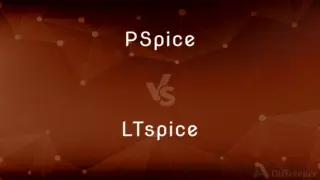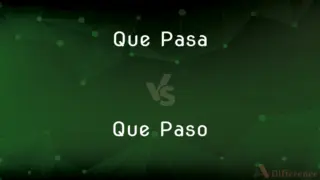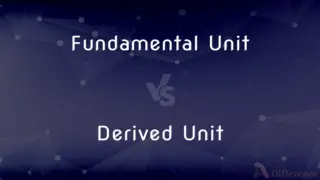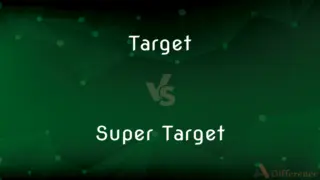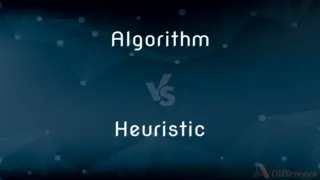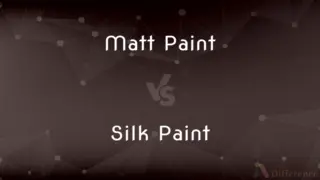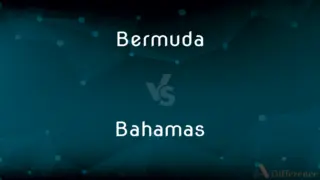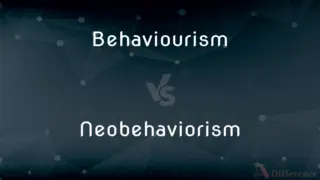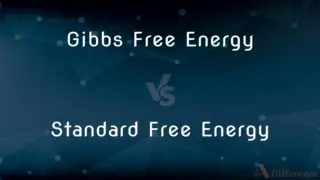Mindscape vs. Landscape — What's the Difference?
By Tayyaba Rehman & Urooj Arif — Updated on April 21, 2024
A mindscape represents a person's mental or psychological state, often used metaphorically, whereas a landscape refers to a physical area's visible features or a genre of art depicting nature scenes.

Difference Between Mindscape and Landscape
Table of Contents
ADVERTISEMENT
Key Differences
A mindscape is an abstract representation of someone's inner thoughts, emotions, or imagination, often depicted in artistic or literary contexts to illustrate mental processes. On the other hand, a landscape specifically denotes the visible features of an area of land, including mountains, hills, water bodies, and vegetation, and is tangible and observable.
The concept of a mindscape allows for the exploration of subjective experiences and mental journeys, providing a platform for deep psychological exploration. Whereas, a landscape can be physically explored and documented, often serving as a subject for photographers and painters who capture its aesthetic and natural beauty.
In literature and art, a mindscape might be used to create a mood or atmosphere that reflects a character's mental state or emotions. Conversely, a landscape painting or photograph aims to represent the physical appearance and mood of a particular location, focusing on color, light, and form.
Mindscapes are inherently personal and can vary greatly from person to person, influenced by individual experiences and emotions. In contrast, landscapes are universal and can be shared and experienced by anyone, often evoking a collective appreciation for natural or urban environments.
While mindscapes are dynamic, changing with psychological states or imaginative shifts, landscapes are generally more static, with changes occurring over longer periods due to natural or human activities.
ADVERTISEMENT
Comparison Chart
Definition
Abstract representation of mental state.
Visible features of an area of land.
Usage
Artistic, literary to explore inner thoughts.
Physical exploration, art depicting nature.
Representation
Subjective, varies by individual.
Objective, consistent across viewers.
Focus
Psychological state, emotions.
Natural beauty, physical elements.
Change Dynamics
Changes with mental or emotional state.
Changes due to natural or human factors.
Compare with Definitions
Mindscape
A mental or psychological landscape, reflecting a person's thoughts or emotions.
The novel delves into the protagonist’s mindscape, revealing his inner turmoil.
Landscape
All visible features of an area of land, often picturesque.
The photographer captured the breathtaking landscape of the mountains at sunrise.
Mindscape
A representation of one's imaginative or conceptual thoughts.
The artist’s latest work is a vivid portrayal of her mindscape during a creative surge.
Landscape
A genre of painting that depicts scenes of nature.
His art exhibition features landscapes that showcase the diverse beauty of the countryside.
Mindscape
A term used in psychology to describe cognitive frameworks.
The psychologist analyzed the patient’s mindscape to assess his mental health.
Landscape
The overall appearance of an area as seen by viewers.
Urban development has significantly altered the city’s landscape over the decades.
Mindscape
A conceptual space where ideas and emotions are visualized.
Therapy sessions often explore the mindscape to understand underlying issues.
Landscape
A term used in geography to describe natural and built environments.
The geographer studied the landscape changes due to recent volcanic activity.
Mindscape
A literary device to depict an individual's mental environment.
The poet uses descriptive language to construct a haunting mindscape in her verses.
Landscape
A layout or arrangement of features within a particular area.
The landscape architect designed a harmonious blend of water features and greenery.
Mindscape
A mental or psychological scene or area of the imagination
"mindscapes, in which memories from an American childhood mingle with those from the fantasy world of the films" (Grace Glueck).
Landscape
A landscape is the visible features of an area of land, its landforms, and how they integrate with natural or man-made features. A landscape includes the physical elements of geophysically defined landforms such as (ice-capped) mountains, hills, water bodies such as rivers, lakes, ponds and the sea, living elements of land cover including indigenous vegetation, human elements including different forms of land use, buildings, and structures, and transitory elements such as lighting and weather conditions.
Mindscape
A representation of such a scene or area, as in a work of art.
Landscape
All the visible features of an area of land, often considered in terms of their aesthetic appeal
The soft colours of the Northumbrian landscape
A bleak urban landscape
Mindscape
A mental landscape; the world of the mind
Landscape
Denoting a format of printed matter which is wider than it is high
Landscape format
Landscape
Make (a garden or other area of ground) more attractive by altering the existing design, adding ornamental features, and planting trees and shrubs
The site has been tastefully landscaped
Landscape
An expanse of scenery that can be seen in a single view
A desert landscape.
Landscape
A picture depicting an expanse of scenery.
Landscape
The branch of art dealing with the representation of natural scenery.
Landscape
The aspect of the land characteristic of a particular region
A bleak New England winter landscape.
Landscape
Grounds that have been landscaped
Liked the house especially for its landscape.
Landscape
An extensive mental view; an interior prospect
"They occupy the whole landscape of my thought" (James Thurber).
Landscape
The orientation of a page such that the shorter side runs from top to bottom.
Landscape
To adorn or improve (a section of ground) by contouring and by planting flowers, shrubs, or trees.
Landscape
To arrange grounds aesthetically or maintain grounds as a profession.
Landscape
A portion of land or territory which the eye can comprehend in a single view, including all the objects it contains.
Landscape
A sociological aspect of a physical area.
Landscape
A picture representing a real or imaginary scene by land or sea, the main subject being the general aspect of nature, as fields, hills, forests, water, etc.
Landscape
The pictorial aspect of a country.
Landscape
A mode of printing where the horizontal sides are longer than the vertical sides
Landscape
A space, indoor or outdoor and natural or man-made (as in "designed landscape")
Landscape
(figuratively) a situation that is presented, a scenario
The software patent landscape has changed considerably in the last years
Landscape
To create or maintain a landscape.
Landscape
A portion of land or territory which the eye can comprehend in a single view, including all the objects it contains.
Landscape
A picture representing a scene by land or sea, actual or fancied, the chief subject being the general aspect of nature, as fields, hills, forests, water. etc. Compare seascape.
Landscape
The pictorial aspect of a country.
The landscape of his native country had taken hold on his heart.
Landscape
An expanse of scenery that can be seen in a single view
Landscape
Painting depicting an expanse of natural scenery
Landscape
A genre of art dealing with the depiction of natural scenery
Landscape
An extensive mental viewpoint;
The political landscape looks bleak without a change of administration
We changed the landscape for solving the proble of payroll inequity
Landscape
Embellish with plants;
Let's landscape the yard
Landscape
Do landscape gardening;
My sons landscapes for corporations and earns a good living
Common Curiosities
Is mindscape a real place
Mindscape is not a physical location but a metaphorical or conceptual space used to describe mental and emotional states.
How does landscape influence art
Landscape influences art primarily through its aesthetic appeal, serving as inspiration for landscape painters and photographers.
What factors can change a landscape
Natural processes like erosion and human activities like construction can significantly alter landscapes.
Can mindscapes be shared between individuals
Mindscapes are personal and subjective, though artists and writers can depict them in ways that resonate with others.
What does mindscape mean in psychology
In psychology, mindscape refers to the mental landscape where a person’s thoughts, emotions, and imaginations reside.
What techniques are used to capture landscapes in photography
Techniques like lighting, perspective, and composition are crucial in capturing the essence of landscapes in photography.
How do mindscapes vary between cultures
Mindscapes can vary based on cultural background, influencing how emotions and thoughts are processed and expressed.
Can landscapes affect mental health
Yes, interacting with positive landscapes, like parks and natural environments, can significantly improve mental health.
Are mindscapes always abstract
While typically abstract, mindscapes can be concretely described or visualized through art and literature.
How do mindscapes influence literature
Mindscapes influence literature by allowing authors to explore and convey complex psychological landscapes of their characters.
What is the importance of landscapes in environmental science
In environmental science, landscapes are studied to understand ecological processes and plan for sustainable land use.
How are mindscapes used in therapy
In therapy, exploring a person’s mindscape can help uncover emotional responses and cognitive patterns.
What is a cultural landscape
A cultural landscape is an area that includes both natural and cultural resources, reflecting the interactions between people and their environment.
Why study urban landscapes
Studying urban landscapes helps in planning and development, aiming to improve living conditions and maintain ecological balance.
What is the difference between a landscape and a cityscape
A landscape generally refers to natural environments, while a cityscape focuses on urban settings.
Share Your Discovery

Previous Comparison
Interpretation vs. Construction
Next Comparison
Route vs. PathAuthor Spotlight
Written by
Tayyaba RehmanTayyaba Rehman is a distinguished writer, currently serving as a primary contributor to askdifference.com. As a researcher in semantics and etymology, Tayyaba's passion for the complexity of languages and their distinctions has found a perfect home on the platform. Tayyaba delves into the intricacies of language, distinguishing between commonly confused words and phrases, thereby providing clarity for readers worldwide.
Co-written by
Urooj ArifUrooj is a skilled content writer at Ask Difference, known for her exceptional ability to simplify complex topics into engaging and informative content. With a passion for research and a flair for clear, concise writing, she consistently delivers articles that resonate with our diverse audience.



















